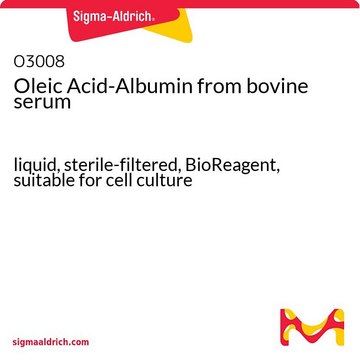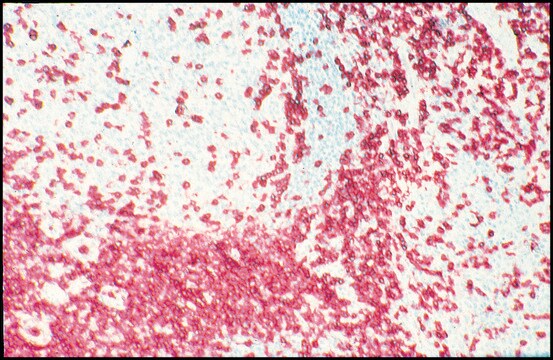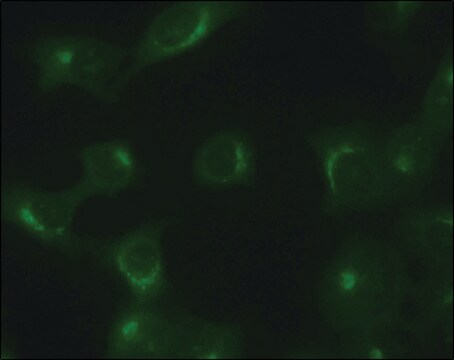CWA-1064
Anti-Human CD3ε (APA1/1) ColorWheel® Dye-Ready mAb
for use with ColorWheel® Dyes (Required, sold separately)
About This Item
Produits recommandés
Source biologique
mouse
Niveau de qualité
Forme d'anticorps
purified antibody
Type de produit anticorps
primary antibodies
Clone
APA1/1, monoclonal
Gamme de produits
ColorWheel®
Forme
lyophilized
Poids mol.
calculated mol wt 23.15 kDa
Espèces réactives
human
Réactivité de l'espèce (prédite par homologie)
mouse
Conditionnement
antibody small pack of 25 μL
Caractéristiques du produit alternatif plus écologique
Waste Prevention
Designing Safer Chemicals
Design for Energy Efficiency
Learn more about the Principles of Green Chemistry.
sustainability
Greener Alternative Product
Technique(s)
flow cytometry: suitable
Isotype
IgG1
Séquence de l'épitope
C-terminal half.
Numéro d'accès Protein ID
Numéro d'accès UniProt
Compatibilité
for use with ColorWheel® Dyes (Required, sold separately)
Autre catégorie plus écologique
, Aligned
Conditions d'expédition
ambient
Température de stockage
2-8°C
Modification post-traductionnelle de la cible
unmodified
Informations sur le gène
human ... CD3E(916)
Description générale
Spécificité
Immunogène
Application
Evaluated by Flow Cytometry in Jurkat cells.
Flow Cytometry Analysis (FC): Staining of one million Jurkat cells was performed using 5 μL of a 1:1 mixture of Cat. No. CWA-1064, Anti-Human CD3e (APA1/1) ColorWheel® Dye-Ready mAb and Cat. No. CWD-PE ColorWheel® Antibody-Ready Phycoerythrin (PE) Dye or an equivalent amount of PE-conjugated Mouse IgG1 isotype control.
Note: Actual optimal working dilutions must be determined by end user as specimens, and experimental conditions may vary with the end user
Compatibilité
Description de la cible
Forme physique
Reconstitution
Stockage et stabilité
Informations légales
Clause de non-responsabilité
Vous ne trouvez pas le bon produit ?
Essayez notre Outil de sélection de produits.
Nécessaire, mais non fourni
Code de la classe de stockage
13 - Non Combustible Solids
Classe de danger pour l'eau (WGK)
WGK 3
Point d'éclair (°F)
Not applicable
Point d'éclair (°C)
Not applicable
Faites votre choix parmi les versions les plus récentes :
Certificats d'analyse (COA)
Vous ne trouvez pas la bonne version ?
Si vous avez besoin d'une version particulière, vous pouvez rechercher un certificat spécifique par le numéro de lot.
Déjà en possession de ce produit ?
Retrouvez la documentation relative aux produits que vous avez récemment achetés dans la Bibliothèque de documents.
Articles
Harness the flexibility of ColorWheel® flow cytometry antibodies and dyes to unlock freedom in your flow cytometry multiplex assay design or multicolor panel design and simplify your multiplex flow cytometry workflows.
Protocoles
Experience simplicity in your flow cytometry workflow with the 3-Step ColorWheel® Flow Cytometry Reagent Preparation protocol. With less than 5 minutes of hands-on time, see how simple it is to create your own optimal flow cytometry reagents with ColorWheel® flow cytometry antibodies and dyes.
View ColorWheel® protocol steps for flow cytometry analysis when using ColorWheel® antibodies with ColorWheel® dyes including antibody preparation, PBMC sample preparation, cell surface staining, and intracellular (cytoplasmic) staining.
Notre équipe de scientifiques dispose d'une expérience dans tous les secteurs de la recherche, notamment en sciences de la vie, science des matériaux, synthèse chimique, chromatographie, analyse et dans de nombreux autres domaines..
Contacter notre Service technique





